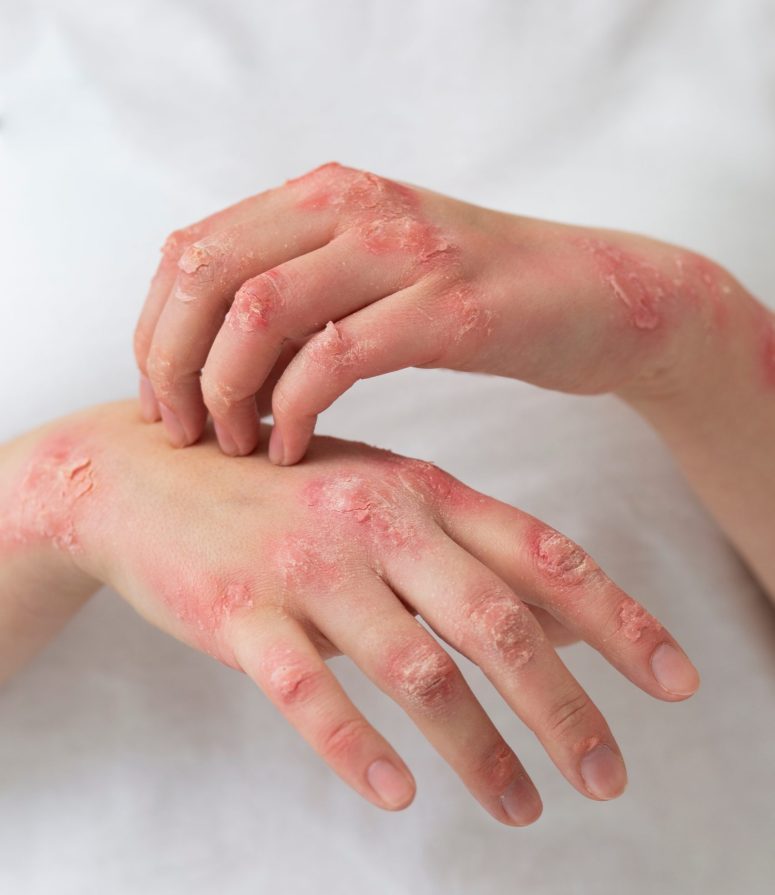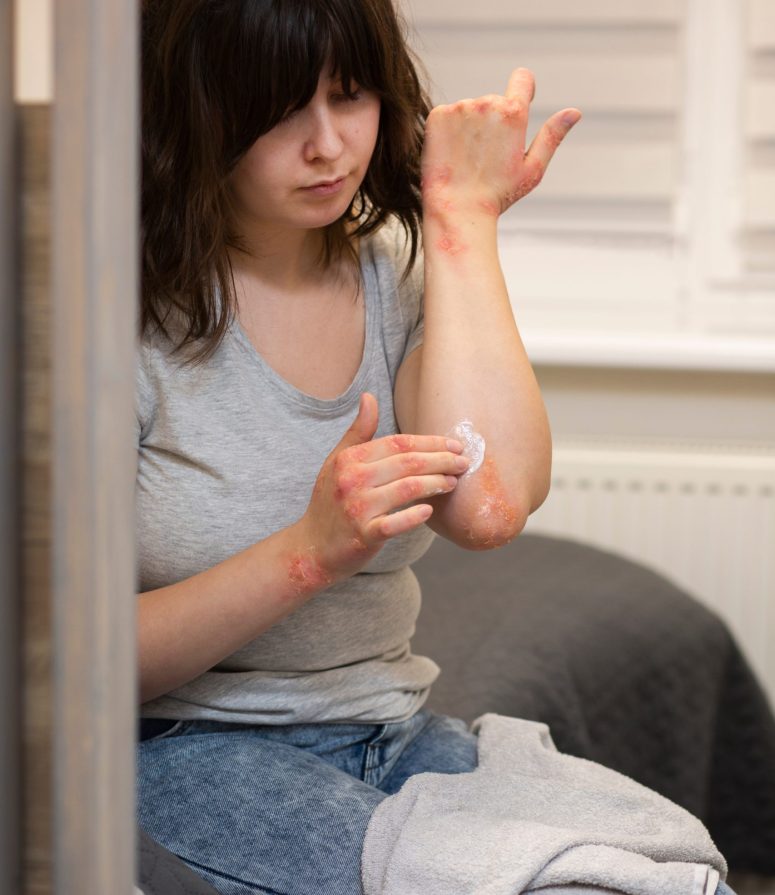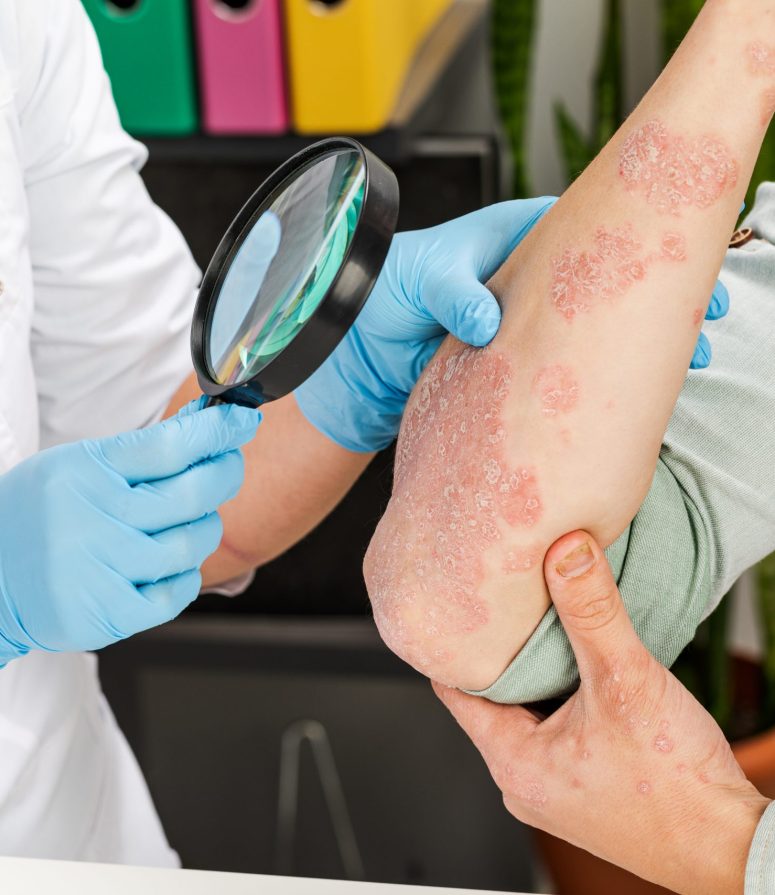Plaque Psoriasis Treatment in Venice, FL —
Effective & Personalized Care
Plaque psoriasis is the most common form of this chronic skin condition, affecting millions of people worldwide. It features unique visible symptoms, including thick, red patches of skin covered in silvery scales. These plaques can appear anywhere on the body but tend to be most noticeable on the elbows, knees, scalp, and lower back. They can cause both physical and emotional discomfort. It takes a personalized plaque psoriasis treatment plan designed to meet your distinctive medical dermatology needs to alleviate symptoms and improve your quality of life.

What is Plaque Psoriasis?
Plaque psoriasis is a chronic skin condition characterized by skin cells that multiply at a faster rate than normal. Excessive skin cells build up to form raised patches, most of which are covered with silvery scales. Patches can appear red, purple, or a grayish color.
How Plaque Psoriasis Differs From Other Types
There are several types of psoriasis, but plaque psoriasis is the most common. An estimated 80 to 90% of people with the condition have this type, requiring plaque psoriasis treatment. They may also have another form of the condition, such as nail psoriasis , pustular, or guttate psoriasis, at the same time.
The other forms do not have those characteristic plaques, though. Guttate psoriasis, for example, causes small spots to form on the skin. With inverse psoriasis, you develop smooth patches in the skin folds, such as those found in the groin, armpits, or under the breasts.
Plaque Psoriasis and Quality of Life Issues
Plaque psoriasis also has the most significant impact on a person’s quality of life. Psoriasis plaques tend to develop in areas of the body that medical professionals refer to as high-impact sites.
These are places where they have the most influence on quality of life, because they can affect:
‣ Mobility
‣ Sleep
‣ Daily tasks like bathing
‣ Emotional well-being
‣ Sleep
‣ Daily tasks like bathing
‣ Emotional well-being
Flare-ups over the knees or elbows can make bending those joints painful and, in some cases, impossible without plaque psoriasis treatment. People with plaque psoriasis can also develop psoriatic arthritis, which causes joints to swell and become stiff, potentially further affecting their quality of life.
For Plaque Psoriasis Treatment In Venice, FL, Contact Us
Causes and Triggers of Plaque Psoriasis
The other forms do not have those characteristic plaques, though. Guttate psoriasis, for example, causes small spots to form on the skin. With inverse psoriasis, you develop smooth patches in the skin folds, such as those found in the groin, armpits, or under the breasts.
Immune System Dysfunction
In autoimmune diseases like psoriasis, the immune system becomes overactive, attacking normal cells. This is likely what triggers the inflammation and rapid cell proliferation characteristic of plaque psoriasis. The skin cells grow and mature too quickly, which causes thick, scaly patches to form.
Usually, skin cells mature every 28 to 30 days. When plaque flare-ups occur, these cells mature every three to four days.
Genetic Factors
Genetics may play a significant role in the development of plaque psoriasis. Psoriasis does tend to run in families. One-third of people with psoriasis have a family member with the condition.
The risk increases if both parents have psoriasis. If one parent has this autoimmune disease, the risk of a child having it is around 10%. If both parents have it, though, that risk jumps to 50%.
Psoriasis is not linked to one single gene, though. Multiple genes contribute to it.
Environmental and Lifestyle Triggers
Genetics is not the sole factor involved. Environmental influences can trigger the condition in individuals with a genetic predisposition.
Some common triggers for plaque psoriasis include:
‣ Infections like strep throat
‣ Weather conditions, primarily cold and dry weather
‣ Skin trauma, this could be something as small as a bug bite
‣ Smoking or secondhand smoke
‣ Regular alcohol consumption
‣ Medications like lithium or high blood pressure drugs
‣ Rapid withdrawal from corticosteroids
‣ Weather conditions, primarily cold and dry weather
‣ Skin trauma, this could be something as small as a bug bite
‣ Smoking or secondhand smoke
‣ Regular alcohol consumption
‣ Medications like lithium or high blood pressure drugs
‣ Rapid withdrawal from corticosteroids
Triggers are unique to each person, however.

How is Plaque Psoriasis Diagnosed?
The dermatologist will look for several things when making a diagnosis of plaque psoriasis and recommending plaque psoriasis treatment. The process starts with an office exam.
Clinical Examination Prior to Plaque Psoriasis Treatment
During the clinical exam, the dermatologist will look for several characteristics of the condition, such as:
‣ Appearance of thick, raised lesions and red skin
‣ The locations of the lesions
‣ How much do the lesions itch
‣ The locations of the lesions
‣ How much do the lesions itch
These are benchmark signs of plaque psoriasis.
Medical History Review To Help Determine Plaque Psoriasis Treatment
The medical history review will include a study of the patient’s family history. Before creating a plan for plaque psoriasis treatment, the dermatologist will want to know if autoimmune diseases, such as psoriasis or psoriatic arthritis, run in the family.
They will review your personal medical history to determine if you have had any infections, particularly strep, that may be a trigger for the condition. They will also examine other potential causes of the symptoms, such as allergies, skin cancer, dermatitis, or different autoimmune conditions, like eczema. Current medication and co-occurring conditions can also offer insight that leads to a diagnosis.
Diagnostic Tests (Skin Biopsy)
If plaque psoriasis is the most likely diagnosis, the next step would be to do a skin biopsy to determine the need for plaque psoriasis treatment. This requires the removal of a small piece of skin to examine under a microscope.
Under the microscope, they will look for specific features, including a thickened epidermis, small blood vessel dilation, and inflammatory cells called neutrophils. A biopsy is necessary to confirm the diagnosis.
For Plaque Psoriasis Treatment In Venice, FL, Contact Us
Dermatology Insights on Symptoms and Challenges of Plaque Psoriasis
The primary symptom of plaque psoriasis is the characteristic plaques that can appear anywhere on the body. Dermatologists rank the severity of psoriasis based on the total body surface coverage, ranging from mild to severe.
Plaque Psoriasis Treatment Options
There is no cure for plaque psoriasis; therefore, plaque psoriasis treatment focuses on managing the symptoms and improving quality of life. The best treatment for plaque psoriasis will also reduce the risk of complications, such as psoriatic arthritis and depression.
In personalized treatment for plaque psoriasis, a step ladder approach is used, based on the severity and location of the flare-up, starting with topical therapies.
Topical Dermatology Treatments for Plaque Psoriasis
Topical treatment serves as the first line of defense. Often, the best treatment for plaque psoriasis involves a combination of topical therapies, starting with corticosteroids to reduce inflammation and control itching. If corticosteroids are not an option, then a topical calcineurin inhibitor might be a practical alternative
A plaque psoriasis treatment using keratolytics will help break down thick plaques, allowing them to fade faster. Topical vitamin D analogs are a standard option for slowing skin growth.
Phototherapy
Phototherapy involves exposing the skin to UV light in a controlled environment. Light therapy can slow cell growth and reduce inflammation. It is an alternative for those who are resistant or intolerant to other therapies or in combination with different treatments.
Laser Therapy
Laser therapy using an excimer laser focuses a highly concentrated, narrow beam of UV light on targeted treatment areas. It is a practical approach to treating localized plaques, especially if they are resistant to other therapies.
Systemic and Biologic Medications
Systemic medications and biologics are an option if topicals and phototherapy fail to produce results. These medications involve suppressing the immune system, which can increase your risk of infection.
Systemic therapies are oral medications such as Methotrexate or Cyclosporine. These are both powerful immunosuppressants.
Biologics are injectable therapies developed in living cells. They typically block T-cells or proteins to control immune system activity.
Combination Therapy
Combined therapies can provide the most effective treatment for plaque psoriasis. For example, combining a topical cream with a systemic oral medication may be the right formula for some people to control flare-ups.
Lifestyle Management
The key to successfully managing plaque psoriasis lies outside the clinic. Lifestyle changes, combined with personalized medication therapies, can provide the most effective treatment for plaque psoriasis.

Avoiding Triggers
You must pinpoint your triggers and avoid them as part of your plaque psoriasis treatment in Venice. Keeping a journal can help you identify the triggers that affect you. Keep track of your daily activities and review your journal when you have a flare-up, looking for patterns.
Skin Care Tips
Proper skin care is essential. Follow a gentle skincare routine, using products recommended by your dermatologist. Also, limit your bath or shower time. This helps keep skin moisturized. If you experience itching, try applying a cool compress to the affected area to help control it and prevent scratching.
Stress Reduction
A critical part of managing the condition at home is controlling stress. Stress is a common trigger for psoriasis, so managing it can help prevent flare-ups.
Practice coping mechanisms to lower stress levels. Deep breathing exercises and regular physical exercise can be beneficial as part of plaque psoriasis treatment in Venice.
Diet and Weight Management
Home care may involve dietary changes that include anti-inflammatory foods, such as omega-3 fatty acids and antioxidants. Limiting processed foods can help remove foods that trigger inflammation, such as those high in saturated fats can be an effective part of a plaque psoriasis treatment in Venice.
Also, maintain a healthy weight. Being overweight can worsen psoriasis symptoms.
For Plaque Psoriasis Treatment In Venice, FL, Contact Us
Why Choose Venice Avenue Dermatology and Plaque Psoriasis Treatment in Venice
Venice Avenue Dermatology offers high-quality dermatologic care and plaque psoriasis treatment in Venice and to residents throughout Sarasota and Charlotte counties in Florida.
Advanced Treatment Technology
Our practitioners are experts in the newest treatment options for plaque psoriasis treatment in Venice. That includes biologics, cutting-edge phototherapy, and laser treatment for stubborn plaques. We offer an on-site NB-UIVB phototherapy suite, eliminating the need for outside referrals.
Convenient Location and Scheduling
We serve Venice, Sarasota, and all surrounding areas in Florida with same-week appointments in case of flare-ups. Our online scheduling system makes booking appointments fast and easy.
Personalized Care Approach
We take a stepwise approach to treatment, utilizing topical therapies, phototherapy, and biologics tailored to the individual needs and severity of each patient. Personalized care is the best way to support you and help control flare-ups with plaque psoriasis treatment in Venice.
What to Expect During Your Treatment for Plaque Psoriasis
You can expect an experienced practitioner to do an initial assessment and confirm the diagnosis of plaque psoriasis. From there, they will create a personalized treatment plan based on your medical review and the severity of the condition.
The treatment is often a combination approach to get the best results. Once you start treatment, monitoring your progress using resources such as the Psoriasis Area and Severity Index (PASI) allows for targeted adjustments to be made.
The primary goal of treatment is to improve your symptoms. The time it takes to meet that goal will vary from person to person.
Since plaque psoriasis is a lifelong condition, long-term management with regular follow-ups is crucial. The dermatologist is there to support your journey and provide honest information about therapy options and step-by-step treatment goals.

Call to Book Your Consultation Today
Call us to schedule a consultation with one of our board-certified practitioners today to discuss your plaque psoriasis treatment.
